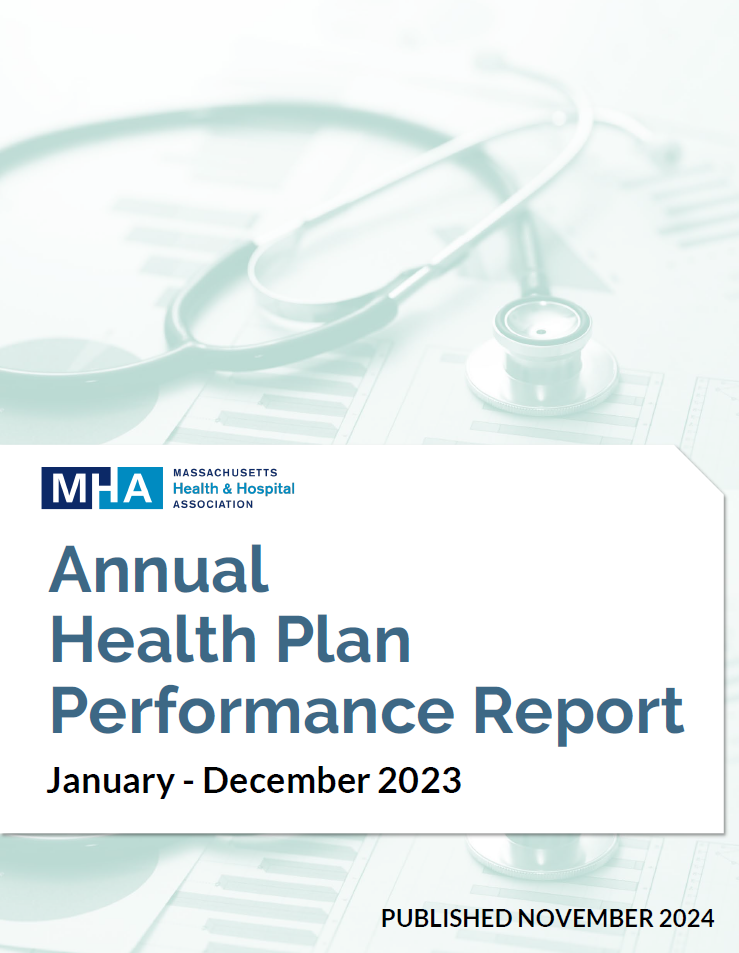PLEASE NOTE: MHA has upgraded its Member Portal. Click here to gain access.
HPC Cost Trends Hearing

INSIDE THE ISSUE
> HPC Cost Trends Hearing
> A Call for Cooperation
> 2023 Health Plan Report
> Healthcare Under Trump
MONDAY REPORT
As HPC Prepares for Cost Trends Hearing, Some Facts to Consider

As the Health Policy Commission (HPC) meets this Thursday for its annual cost trends hearing, Massachusetts hospitals, health systems, and physician practices are calling attention to some compounding factors that are destabilizing the state’s vaunted healthcare system, and are calling for a return to the cooperative spirit that has helped repair that system in the past.
The HPC’s hearing begins at 9 a.m. and is billed as an investigation into how the system can move “from crisis to stability.” It comes just weeks after three trusted provider organizations assumed control of six failing hospitals within the bankrupt Steward Health Care system.
But while government regulators, hospital systems, healthcare workers, and patients devoted their efforts to resolving the Steward situation, the underlying problems of the healthcare system continued to fester. Concerns have grown among healthcare leaders that the resolution of the Steward saga will draw attention away from the cascade of crises that the rest of the sector is experiencing.
A new, interactive “sector snapshot” from MHA shows some difficult-to-resolve, indisputable facts. Length of hospital stays are increasing without an accompanying increase in care reimbursements. Patients are stuck in hospitals unable to transition to other care sites, and the number of available beds is limited due to persistent healthcare workforce shortages. Hospitals alone are financially underwriting Health Safety Net funding shortfalls for uninsured patients at a cost approaching $200 million per year. (You can reference this static version of the publication if your browser does not support the interactive features.)
“Every Massachusetts healthcare system has lost money in at least one of the past five years, and four of five have lost money in at least one of the past two years,” the report notes, citing the state’s own alarming statistic that the median operating margin for all hospitals stands at negative -.09%.
The new publication also highlights what is at stake should these trends persist: a system that ranks number one for access and affordability, provides jobs to one out of eight people in the commonwealth, and serves as an essential, 24/7 resource for patients in need.
“Solutions Start with Acceptance”: How to Resolve the Problem
Following years of relative harmony and collaborative progress sparked by the COVID emergency, various interests in Massachusetts have begun participating in a healthcare-cost blame game. And because hospitals are the biggest component of the healthcare dollar, they have been on the receiving end of an organized campaign to defame them.
Last week, MHA President & CEO Steve Walsh responded with an op-ed in CommonWealth Beacon magazine entitled Mass. hospitals are teetering on the edge.
In it, he lays out the causes of the financial problem, mirroring many of the arguments seen in MHA’s new sector analysis document (see story above).
“All of these factors are intertwining to create a crisis that is slowly destroying care delivery for providers and their patients,” Walsh wrote. “Yet, despite its magnitude, it is still not fully understood outside of those who are struggling to keep hospitals afloat each day, 24/7, 365. Even worse, it has given oxygen to crisis-deniers who are more interested in finger-pointing than collaboration.”
The immediate “ask,” he said, is for there to be a collective recognition of the mounting challenges that hospitals oftentimes are facing on their own.
“Solutions start with acceptance. Given the stakes, it is imperative that everyone involved in healthcare – from insurers to business partners to policymakers – recognize the new reality of hospital finances, move past out-of-touch arguments that thrive off blame, and help us restore a basic sense of stability to the Commonwealth’s most essential sector,” Walsh wrote. “There is simply no other option but for all of us to be working from the same set of facts if we want to control costs and keep patient services off the chopping block.”
MHA’s Latest Report on Health Insurance Companies
MHA’s Annual Health Plan Performance Report, which covers the entire 2023 calendar year, is being sent to the membership in the coming weeks. The report presents an analysis of the financial position of health plans in Massachusetts by looking at a variety of measures, including plan membership, premium rates, medical and administrative expense trends, and profitability, liquidity, and solvency statistics.
Some key takeaways from the report include:
In 2023, financial results were mixed for the plans, with Fallon Health, Health New England, and Point32Health plans all experiencing negative profit margins. HMO Blue had the highest profit margin, ending the year with a 3.2% gain.
Health plan net worth, defined as capital plus surplus, increased to its highest point in history. In total, health plans are carrying $6.2 billion in statutory net worth surplus – a 26% increase compared to 2019.
The aggregate amount of risk-based capital above 500%, which is more than double the company action level that would require intervention by the Division of Insurance, is $1.5 billion.

In May 2024, MassHealth reached the end of the 14‐month redeterminations process, which began in April 2023. According to the state, approximately 133,000 individuals enrolled in health insurance through the Connector after becoming ineligible for MassHealth. This represented approximately one quarter of individuals deemed ineligible for MassHealth but eligible for a qualified health plan through the Health Connector.
Post Election: What’s Next for U.S. Healthcare?
Now that Donald Trump has won last Tuesday’s presidential election, hospitals and health interests are attempting to visualize what his return to the Oval Office will mean for the nation’s healthcare sector over the next four years – and beyond.
His sweeping victory was accompanied by Republicans retaking control of the U.S. Senate. As of Monday Report’s deadline, control of the U.S. House of Representatives was still unresolved but appeared to be leaning Republican, giving Trump a clear path to institute his policies.
The incoming president has been a frequent vocal opponent of the Affordable Care Act (ACA) but his policy plans for overturning or reforming it have always been vague. He drew criticism for saying during his debate with Vice President Kamala Harris that he had only “a concept of a plan” for reforming the ACA.
A clearer picture emerged from House Speaker Mike Johnson (R-La.), who while campaigning for Trump in Pennsylvania said, “Healthcare reform’s going to be a big part of the agenda. When I say we’re going to have a very aggressive first 100 days agenda, we got a lot of things still on the table … The ACA is so deeply ingrained, we need massive reform to make this work, and we got a lot of ideas on how to do that.”
Johnson later clarified that while he did not think it was possible to completely scuttle the ACA, he believes significant changes to it are possible and will occur. The subsidies that were created during the pandemic and that have since been extended to assist people buying coverage, have come under fire from Republicans and could be targeted.
Just days after the election, speculation began about who could become cabinet secretaries in a Trump Administration. The former president in a podcast interview with Joe Rogan just before the election said he had told Robert F. Kennedy Jr. to “focus on health, focus – you can do whatever you want.” Kennedy, in a Zoom call with his supporters told them, “The key, which President Trump has promised me, is control of the public health agencies, which is HHS and its sub-agencies, CDC, FDA, NIH and a few others. And also the USDA, which is, you know, key to making America healthy, because we’ve got to get off of seed oils and we’ve got to get off of pesticides.”
While most do not expect Kennedy to be named HHS secretary (which would require Senate approval), he most likely would be appointed a special advisor with influence across the health landscape. Last Wednesday, Florida Governor Ron DeSantis went on social media to endorse his state’s Surgeon General, Joseph Ladapo, a vaccine skeptic, as HHS secretary.
Telehealth flexibilities and funding for Hospital at Home, among other things, are set to expire during the current session of Congress. It is unclear if the Trump Administration would want those items to be handled before the session ends December 20, to clear the table, or if they’ll be delayed until a new Congress is sworn in. Trump or his surrogates have been critical of the nursing home staffing ratios imposed during the Biden Administration, and his administration may seek to eliminate those.
It is also expected given the tenor of the language throughout the campaign that equity-driven regulations and language woven into various health initiatives may be targeted in the early days of the administration.
As for Medicaid, the historical Republican plan has been to return more of the program to the states – whether that means issuing block grants, or imposing work requirements, or cutting the federal share of matching funds.
On Medicare, while such entities like the 2025 Project (which Trump said he had nothing to do with) advocate making Medicare Advantage (MA) the default option for enrollees, recent bipartisan efforts in Congress to rein in MA abuses may take precedence.


 Massachusetts Health & Hospital Association
Massachusetts Health & Hospital Association